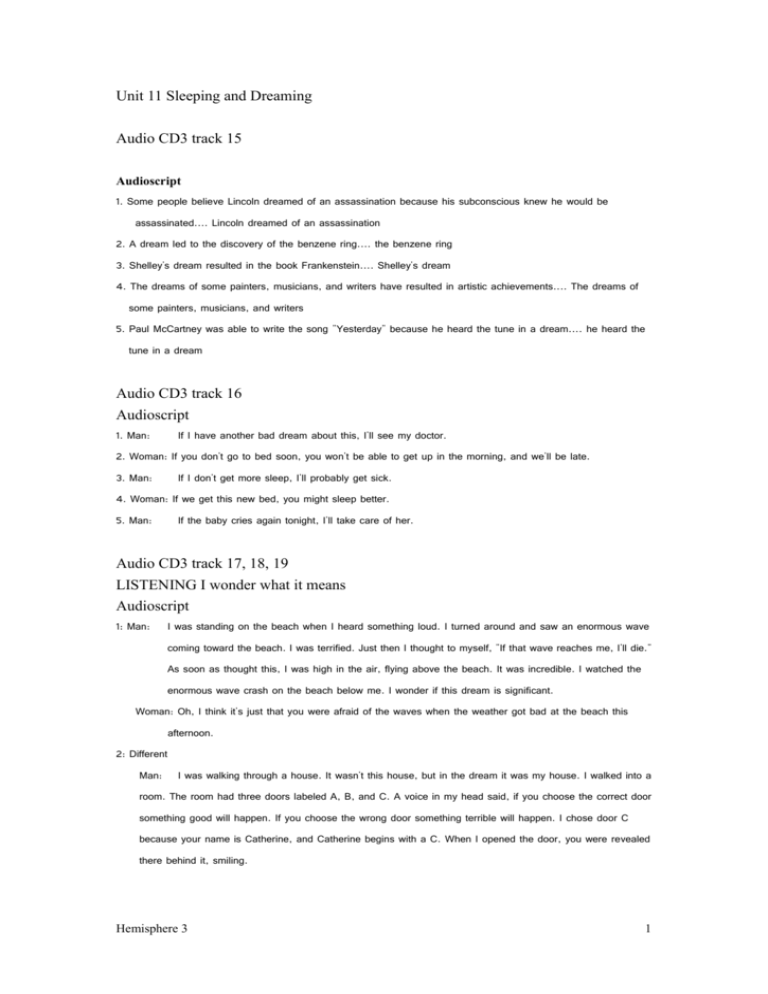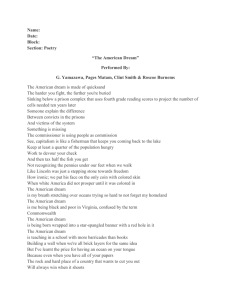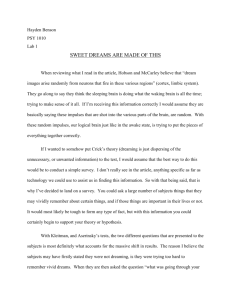Unit 3 Relating
advertisement

Unit 11 Sleeping and Dreaming Audio CD3 track 15 Audioscript 1. Some people believe Lincoln dreamed of an assassination because his subconscious knew he would be assassinated.... Lincoln dreamed of an assassination 2. A dream led to the discovery of the benzene ring.... the benzene ring 3. Shelley's dream resulted in the book Frankenstein.... Shelley's dream 4. The dreams of some painters, musicians, and writers have resulted in artistic achievements.... The dreams of some painters, musicians, and writers 5. Paul McCartney was able to write the song "Yesterday" because he heard the tune in a dream.... he heard the tune in a dream Audio CD3 track 16 Audioscript 1. Man: If I have another bad dream about this, I'll see my doctor. 2. Woman: If you don't go to bed soon, you won't be able to get up in the morning, and we'll be late. 3. Man: If I don't get more sleep, I'll probably get sick. 4. Woman: If we get this new bed, you might sleep better. 5. Man: If the baby cries again tonight, I'll take care of her. Audio CD3 track 17, 18, 19 LISTENING I wonder what it means Audioscript 1: Man: I was standing on the beach when I heard something loud. I turned around and saw an enormous wave coming toward the beach. I was terrified. Just then I thought to myself, "If that wave reaches me, I'll die." As soon as thought this, I was high in the air, flying above the beach. It was incredible. I watched the enormous wave crash on the beach below me. I wonder if this dream is significant. Woman: Oh, I think it's just that you were afraid of the waves when the weather got bad at the beach this afternoon. 2: Different Man: I was walking through a house. It wasn't this house, but in the dream it was my house. I walked into a room. The room had three doors labeled A, B, and C. A voice in my head said, if you choose the correct door something good will happen. If you choose the wrong door something terrible will happen. I chose door C because your name is Catherine, and Catherine begins with a C. When I opened the door, you were revealed there behind it, smiling. Hemisphere 3 1 Different Woman: I think you've been worried about making an important decision. You're going to listen to your own inner voice, your own heart. I think deep down, there's a part of our mind that directs us. Deep down, you know what to do. I also think you've been worrying that I might not support you. But in your heart, you know I will. 3: Different Man: An angry bear was chasing me through the forest. I was running as fast as I could, but the bear kept getting closer and closer. I was terrified. I jumped into a nearby tree and started climbing. To my horror, the bear starting climbing the tree behind me. Suddenly, I decided to turn around and look at the bear. The bear looked back. It looked like it hated me. It looked so angry. I said to the bear, "You are not really angry. You are hungry. If you go back to the ground, I'll find you something to eat." The bear climbed back down the tree then, and I woke up. I wonder what that meant. Different Woman: I think it's clear. I think part of you has been angry about something. That's the bear. But there's another part of you that is telling you that your feelings are OK. That your anger is really just a need for something, a lack of something. But you don't like to show anger. So the dream is telling you that you really are angry, but that there is something under the anger, and that this is OK. Audio CD3 track 20 Audioscript 1. A: I had a terrible dream last night. It woke me up. B: Right. I heard you. A: I dreamed people were chasing me. I thought they were trying to kill me. You were with them. B: Really? A: Yes. I ran into a house, and I went into the bathroom to hide. I heard someone follow me into the house. I knew it was you. B: Hmm. 2. A: Last night, I dreamed my cat could talk. B: Hmm. A: She looked at me and said, "You will never know me as well as I know you." B: Huh. A: And what she said is probably true. I think cats know their owners very well. B: Mm-hmm. They do. A: Anyway, I don't remember what else my cat said, but we had a long, serious conversation. I know you'll say this dream probably symbolized something. B: Uh-huh. I think it does. Audio CD3 track 21 Hemisphere 3 2 Audioscript Narrator: Listen to a lecture on the science of dreams. You may take notes as you listen. Then answer the questions. Dreams are a part of life, but what are dreams really made of? Why do we dream? Some researchers favor physiological theories, explanations that concentrate on the workings of the human body, specifically of the neural connections in our brains. Others promote psychological theories. They say dreams are psychologically necessary, that they help us sort through our experiences and thoughts. There are even some theorists who believe our dreams can predict future events. Sigmund Freud was at the forefront of the psychological approach. His theories are based on the idea of repressed longing or desires we are not able to express in public. He believed that dreams allow the unconscious mind to act out taboo urges. His focus was primarily on sexual desires, repression, and symbols of sex. One of his proteges, Carl Jung, also believed in the psychological origin of dreams. Later in life, he shifted away from some of Freud's theories and focused more on the idea that dreams allow us to reflect on our waking experiences and that they can help us solve our everyday problems. One theory, and perhaps the leading theory today, has created a big rift in dream research—the Activation-Synthesis Theory. This theory was set forth in 1973 by Allan Hobson and Robert McCarley. Their research on sleep gave them the idea that dreams were the result of random electrical brain impulsesthat extract images from our memories. The dreams don't tell a story, but our brains create a storyline in order to make sense of the random pictures generated while we sleep. Audio CD3 track 22 Audioscript Narrator: Listen again to two passages from the lecture. Answer the question you hear after each passage. First passage: Lecturer: One theory, and perhaps the leading theory today, has created a big rift in dream research—the Activation-Synthesis Theory. Narrator: What does the lecturer claim about Activation-Synthesis Theory? Narrator: Second passage: Lecturer: The dreams don't tell a story, but our brains create a storyline in order to make sense of the random pictures generated while we sleep. Narrator: Why does the lecturer use the phrase "create a storyline"? Hemisphere 3 3 Hemisphere 3 4






